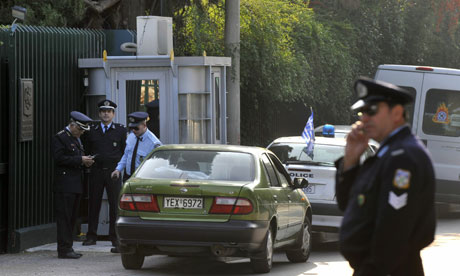
By tonight, at least 11 letter bombs had been detected in the Greek capital, one addressed to Nicolas Sarkozy and eight to the embassies of Bulgaria, Russia, Germany, Switzerland, Mexico, Chile, the Netherlands and Belgium. Greek police said international postal and parcel services would be suspended for two days.
In Berlin, German authorities destroyed a bomb addressed to Chancellor Angela Merkel. The package was sent from Greece two days earlier by UPS delivery and resembled the Athens parcel bombs, according to German interior minister Thomas de Maizière.
Sarkozy, in London for a meeting with David Cameron, said French authorities were working with Greek police.
"The threat is very serious. We are extremely vigilant and I am following it very closely," he told reporters.
A further two bombs were destroyed in controlled explosions at the Athens airport – one addressed to the European Union's highest court in Luxembourg and the other to law enforcement agency Europol in the Netherlands.
Two mail bombs were sent to Greece's 300-seat parliament building in Syntagma square. In each case the bombs were delivered by courier, according to police. No injuries were reported.
The attacks in Greece, attributed to homegrown terror groups rather than al-Qaida, came in the wake of a similar campaign against the Belgian, Dutch and Mexican embassies yesterday, when two Greek men were arrested. One of yesterday's booby-traps was addressed to Sarkozy.
Authorities hope that the men, aged 25 and 22, will help to throw light on the radical anti-establishment groups believed to be behind a wave of terrorist attacks since Greece was rocked by riots following the police shooting of a teenager in Athens two years ago.
At least one of the detainees, a chemistry student who was seized wearing a wig and bulletproof vest, is believed to be linked to a radical group called the Conspiracy of Cells of Fire.
The group, which has claimed responsibility for numerous attacks against government buildings, banks and other targets, is thought to be linked to the Sect of Revolutionaries urban guerrillas who have killed police officers and a prominent journalist, and vowed to turn Greece into a "war zone".
Despite the emergence of radical, anarchist-oriented organisations bent on targeting "symbols of capitalism", analysts were flummoxed by the attacks – and the choice of targets. Counter-terrorism officials said it was the first time that so many embassies had been targeted simultaneously and in such a brazen manner.
"Are they [attacks] aimed at testing our resolve or a sign of something more ominous to come?" said one security official, who did not want to be named. "We are not ruling out more attacks."
The foreign ministry stepped up security at diplomatic missions across the country. At some embassies measures are notoriously lax.
The campaign used small devices that only caused one injury and minimal damage. But it highlights the difficulty of keeping bombs out of the international delivery system, also a target of Yemen-based militants armed with more powerful and potentially deadly explosives.
It was unclear whether the bomb sent to Germany was delivered by land or air. If sent by air, it would highlight the potential limitations of air cargo security that remain, despite the concern triggered by the mail bombs dispatched recently from Yemen.
Anger over draconian economic austerity measures, which resulted in violent street protests earlier this year, has been reinvigorated as the nation slips deeper into recession.
The prime minister, George Papandreou, enforced the unpopular cost-cutting policies, including wage and pension cuts, in exchange for €110bn of emergency aid from the EU and IMF as the country teetered on the brink of bankruptcy.
As his first test at the ballot box since assuming office, he says the election will reflect his government's ability to forge ahead with long overdue reforms. He has repeatedly hinted that he may call early general elections if his socialist Pasok party is heavily defeated.
A government spokesman, George Petalotis, called the bombing campaign a deliberate attempt to "terrorise" public opinion ahead of the poll.The unprecedented campaign has highlighted the debt-stricken country's charged political atmosphere in the countdown to crucial local polls on Sunday.
If domestic Greek terrorists are confirmed to have carried out the attacks, it would mark a dramatic escalation for organisations that have never before attempted to strike targets abroad.
Posted by Ybo